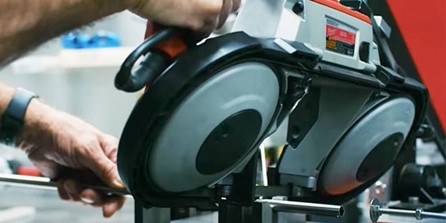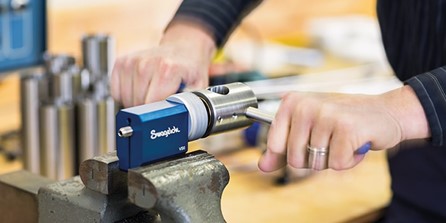The contact details on this website refer to the Manchester office of Swagelok Central UK - Click here for contact details for the Bristol office.
Swagelok Training Courses
Swagelok training courses provide skills for developing, building, and maintaining reliable fluid systems. Taught by Swagelok-certified trainers at locations and times convenient to you, these courses provide the foundation and techniques needed to build and operate high-performing fluid systems.
In this one day course delegates will learn the foundations of tube fitting knowledge including design and installation that ensures system integrity and minimises the risk of leaks. The course covers theoretical aspects of “Tube versus Pipe”, correct selection and identification of tubing, including storage, cutting, and deburring. The assembly of Swagelok® tube fittings and gauging, which includes aspects of pipe threads; thread sealing; thread galling; and safety considerations.
Course content
- Tubing
- Tube fitting history
- Installation procedures
- Leakage
- Swagelok tube fitting
- The quarter turn demonstration
- Tube fitting installation demonstration
- Tapered threads and straight parallel threads
- Fitting products to make the job easier
- Tube bending
- Theoretical and practical examinations
- Course evaluation
Who should attend?
As well as installation personnel directly involved, the course is of benefit to everybody who has a vested interest in safe, reliable, low-cost system installations.
Assessment
Delegates will be required to answered a written theory test and produce a test loop, from stainless steel tubing, to dimension and tolerance drawings. Correctly assembled loops are leak tested with Nitrogen gas and then hydraulically tested up to the burst pressure of the tube.
On successful completion of this course attendees receive a mounted test loop and Global Standard Swagelok Certificate of Completion, lasting three years.

Proper inspection is significant in reducing and minimising possibility of leaks. In this half day course delegates will learn to identify correct tube system placement, correctly install Swagelok® tube fittings, and solve other common fluid system mistakes.
Course content
- Common errors leading to tube-fitting leakage
- Tube-system design practices
- Tube-fitting installation practices
- Mixed-material fittings
- Variables associated with proper tube selection
- Tube bending
- Correct pipe thread usage and assembly
- Course evaluation
Who should attend?
This course is designed for anyone who works with tube fittings and requires a skill set that enables them to identify incorrect installations in the field.
Prerequisite
Successful completion of Swagelok’s Tube Fitting Installation training course.
Assessment
Delegates will be required to complete a comprehensive practical examination.
On successful completion of this course attendees receive a Global Standard Swagelok Certificate of Completion, lasting three years.
This 1 hour virtual course provides an introduction to the properties of hydrogen and the risks associated with handling Hydrogen gas in the workplace and within systems. Intended as the first step in developing safety awareness for your employees. Delivered by Technical Manager, Paul Stevens, who is also Regional Field Engineer who is highly experienced with Hydrogen systems and applications.
Course content
- Basic Introduction to Hydrogen
- What is Hydrogen
- What are the risk associated to Hydrogen
- Hydrogen best practices
- Course evaluation
Who should attend?
Businesses looking at introducing Hydrogen systems into their business or anyone looking to better understand and control the risks associated with Hydrogen.
Assessment
Delegates will be asked to participate in a question and answer session at the end of the course. A certificate of attendance will be awarded to all delegates in attendance.

If you’re designing a critical fluid system, you’re likely considering welding for assembly. With the Swagelok® M200 welding system, it’s easy to make precise, consistent, quality welds. While automatic orbital welding can help you overcome issues related to widespread welder shortages, orbital welding training is essential to equip your emerging welders for success. You can make the most of what modern orbital welding offers with our five-day course, held at our Birchwood, Warrington sales and service centre.
Course content
- Understand basic GTAW welding principles
- Understand welding principles specific to the Swagelok M‐200 Weld System (SWS)
- Know the proper set up and operation for SWS
- Know how to troubleshoot welding problems
Module 1 GTAW
- Understand the GTAW process
- Know the functions of GTAW components
- Understand the process limitations and advantages
- Know the process variables
Module 2 Power Supplies
- Know the different types of power supplies used in GTAW
- Understand DCEN and its advantages
- Understand pulsed dc welding and its variables
- Know how to calculate average welding current
- Understand how the arc is initiated and the weld cycle is completed
Module 3 Electrodes
- Understand the importance of the electrode in GTAW
- Understand the method of electrode classification
- Understand the effects of electrode configuration on the welding process
- Know how to avoid electrode contamination
Module 5 Shielding Gases
- Understand the purpose of shielding gas in GTAW
- Understand the types of gases used
- Know how to determine the purge volume flow time
- Know how to handle gases safely
Module 6 Materials
- Know the common metals welded with GTAW
- Understand the relationship between materials properties and GTAW welding
- Know the advantages of GTAW for welding refractory and reactive metals
- Know how to overcome the welding problems related to high/low sulphur levels.
Module 7 Joint Design
- Know the types of weld joints
- Understand the strengths and weaknesses of weld joint designs
- Know proper joint preparation
Module 8 Welding Techniques
- Know the techniques used in orbital welding
- Understand the advantages and disadvantages of:
• Single level single pass
• Single level multiple pass
• Multiple level single pass
Module 9 SWS Overview
- Be familiar with the SWS power supplies
- Know about the SWS weld heads
- Know about fixturing and collets
- Understand the material welding capabilities of the SWS
- Know about additional equipment requirements
Module 9 SWS Setup
- Know how to use the User Manual
- Understand safety precautions
- Know how to unpack and set up the SWS power supply
- Know how to install a shielding gas system
- Know how to install the weld head and electrode
- Know how to use a fixture block to fixture tubing
- Understand weld parameters and successfully perform a test weld
Module 10 Operational Concepts
- Understand the function of the power supply controls
- Understand the concept of a weld procedure guideline
- Know how to create and utilize a WPG
- Know how to refine a WPG
Module 11 Hands On Exercises
- Know the key elements to good orbital welding
- Understand proper weld joint preparation
- Understand the purpose and use of fixturing
- Understand good welding techniques by practical exercises
- Know how to evaluate weld quality
- Understand how to use the weld adjust feature to refine weld penetration
Module 13 Maintenance and Troubleshooting
- Know the proper techniques to maintain weld heads and fixture blocks
- Know how to use troubleshooting tables
- Understand how to effectively troubleshoot problems
Who should attend?
This course is intended for individuals who have not had previous orbital welding training. The course introduces attendees to basic welding principles and the fundamentals of orbital welding. A hands on comprehensive review of the welding equipment enables attendees to set up, operate and troubleshoot equipment performance and critique weld quality. This basic course includes information regarding the M200 power supply, weld heads, fixturing and the tube facing tool.
Assessment
On successful completion of this course attendees receive a Swagelok Global Standard Certificate of Completion.
On the 5th day delegates can choose to test for ASME Section IX qualification if they need to fulfil QA/QC requirements.
All of our instructors hold Certified Weld Inspector (CWI) and Certified Weld Educator (CWE) qualifications, as well as at least five years’ experience in orbital welding instruction.
One of the most daunting challenges in the development of safe, dependable, and leak-tight hydrogen fluid systems is the nature of hydrogen itself.
Hydrogen is a small-molecule gas that can easily escape through the tiniest of crevices and diffuse into the materials designed to contain them. In many industrial applications, hydrogen must also be stored at pressures in excess of 700 bar for maximum cost efficiency and to achieve the necessary energy density. Further, the handling and management may require rapid thermal and pressure changes can also impact system integrity.
Building fluid systems designed to overcome these challenges requires the right components, materials, expertise, and training. Swagelok® Tubing System Training Program for hydrogen applications has been developed with this in mind. This program provides hands-on training for those responsible for designing, installing, maintaining, and inspecting H2 tubing systems.
Course content
This training program is designed to provide knowledge and understanding of:
- What is Hydrogen
- Hydrogen Compatible Materials
- Risk Mitigation and Best Practices
- Tube Fitting Installation
- Tube Bending
- Tube Fitting Installation Inspection
- Higher Pressure Module
- FK Medium-Pressure Tube Fittings
- Cone and Thread Fittings
- Leak Testing
- Knowledge Test
Who Should Attend
Ideal for installers, technicians, engineers, designers, QC/QA inspectors, and others responsible for designing, installing, maintaining, and inspecting tubing systems in hydrogen and small molecule gas delivery systems.
Course Format
This training program provides in-depth, comprehensive focus areas beginning with a foundational understanding of H2 and progressing through critical aspects such as materials science, installation, tube bending, and fitting technologies.
Successful attendees will receive a Swagelok® Certificate of Completion which is valid for three years. For added customer assurance, training certificates are tracked using a centralised Swagelok Customer Training Records System. This enables those who have completed the course and their employers quick and easy verification of training records.
Resources
 Tube Fitting Installation: Everything You Need to Know
Tube Fitting Installation: Everything You Need to Know
 How to Avoid Fluid System Leaks
How to Avoid Fluid System Leaks
 Tube Cutting Tools and Other Essential Fluid System Tools
Tube Cutting Tools and Other Essential Fluid System Tools





